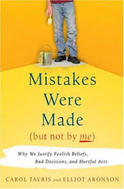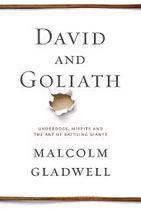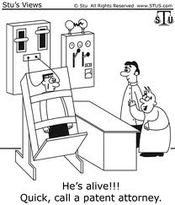 I just finished reading Mistakes Were Made But Not By Me by Carol Tavris and Elliot Aronson, which I had heard about through Tim Ferriss's podcast episode with Dr. Peter Attia. The book takes a deep dive into the issue of cognitive dissonance and self-justification: how people do and believe dumb things to maintain the feeling they are smart and in control, even when they are wrong or make mistakes. This leads to some serious problems in the long run, with people and systems spiraling into corruption one small step at a time. I enjoyed the first half of the book, which focused on the aspects of psychology and scientific studies about brain behavior and memory. The second half of the book delved into the specific examples of how self-justification can infect and ruin various parts of society like criminal law, marriage, therapy, and torture. I thought this second half went way deeper into each topic than I was personally interested; the examples were painful, horrific, and really made me upset about how badly self-justification affects real lives, but I got that point very quickly and really wanted the author to move on to solutions and suggestions for improvement. There was a very small amount of that in the last chapter, and I was hoping for more. Here are some of my biggest takeaways, and my full notes are below.
0 Comments
 Being a fan of Malcolm Gladwell's other books, I was excited to read his latest David and Goliath: Underdogs, Misfits, and the Art of Battling Giants. I found it really engaging, and the author kept true to his established style of surprising the reader with interesting and thought-provoking stories and questions. The beginning of the book is about the biblical David vs. Goliath story, and it exposes some myths we hold as a culture about what it means to be an underdog and potentially how wrong we are about the balance of power. Gladwell points out some important ways in which underdogs routinely are more powerful and skilled than their giant opponents. However, that's pretty much where the title theme of the book stops, as I found the rest of it to be a lot more about overcoming difficulties and how "desirable difficulties," like mid-sized classrooms, dyslexia, and childhood bereavement can actually make people stronger and much more accomplished. Each of the book's chapters focuses on a few specific people's lives, and these stories, taken from different points in history, show various ways in which people over time responded to similar difficulties. I liked how all the major parts of the book built on each other in this regard. The main evidence of the book comes from research studies and the many interviews that the author conducted with the main characters of the stories he recounts. I wondered a lot about how the ideas of unexpected strengths and weakness can apply to the world of start-up Davids vs. big company Goliaths. What are the strengths and weaknesses that we traditionally ascribe to each but which might indeed be backwards? I definitely recommend this book to anyone who likes Gladwell's other writing and especially people interested in education, criminal law, learning disorders, and history. I'm pretty mixed on patents. I understand that if a company invests huge resources into discovering something, it is unfair for someone else to simply piggyback and copy it (but I think companies should make money from execution and service, not ideas). I understand there is societal benefit to sharing inventions (but I think the current system doesn't accomplish that since it's impossible to keep up with the multitude of patents granted and in-progress). I believe that many of the lawsuits around software patents are frivolous (and many of the duplicating/overlapping patents shouldn't have been granted in the first place), so the whole situation is a mess. Too many people still pay attention to "patent portfolios" (with quantity often more important than quality), and that attitude causes difficulties for entrepreneurs wondering if they should spend their time and money collecting [often useless] patents simply to show off. Also, the recent law change that gives priority for patentability to those who file first instead of those who invent first requires filing patents immediately upon thinking of an idea, which is costly and sort of ridiculous/impossible for everyday people or entrepreneurs to do (and incentivizes patent trolls). I heard an interesting session last week at UCLA Anderson by an accomplished patent attorney, Todd Miller. It was generally on tips for entrepreneurs (and less on controversial issues like should there be patents or how the system should be reformed). Below are my main notes and takeaways. What do you guys think about the issues I've raised above? Tip 1: Work backwards.
|
Archives
June 2024
Categories
All
Subscribe |

 RSS Feed
RSS Feed
